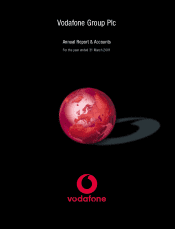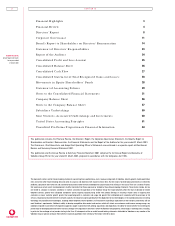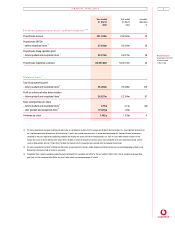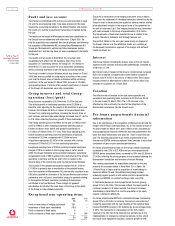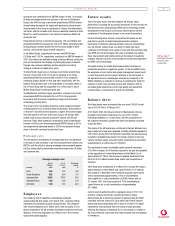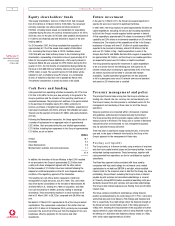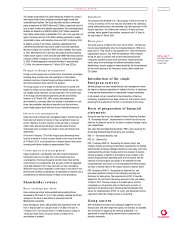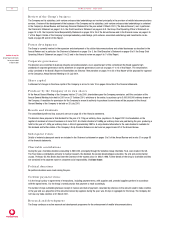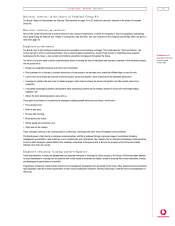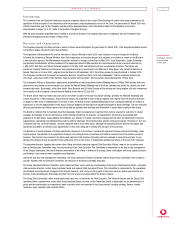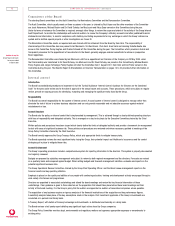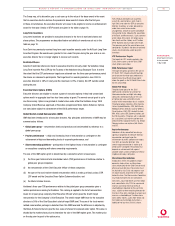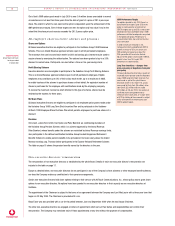Vodafone 2001 Annual Report Download - page 9
Download and view the complete annual report
Please find page 9 of the 2001 Vodafone annual report below. You can navigate through the pages in the report by either clicking on the pages listed below, or by using the keyword search tool below to find specific information within the annual report.
FINANCIAL REVIEW
Vodafone Group Plc
Annual Report & Accounts
for the year ended
31 March 2001
7
The Group’s preservation of its credit ratings has enabled it to access a
wide range of debt finance including commercial paper, bonds and
committed bank facilities. The Group has dollar and Euro commercial
paper programmes for US$15 billion and £2 billion, respectively, which it
uses to meet its short term liquidity requirements. The commercial paper
facilities are backed by a US$14.55 billion (£10.2 billion) committed
bank facility, which expires in September 2001, with a one year term-out
option. The Group also has £13.5 billion (sterling equivalent) of capital
market debt in issue, with maturities from June 2001 to February 2030.
In addition, certain of the Group’s subsidiary undertakings have
committed facilities that may only be used to fund their operations.
Misrfone in Egypt has a facility of EGP2.4 billion (£438m) that expires
in 2005, Mannesmann AG in Germany has bilateral facilities totalling
K562m which expire in 2004 and 2006 and VRAM Telecommunications
Company Limited in Hungary has a facility of K350m that fully expires
in 2008. Of these aggregate committed facilities of approximately
£1,005m, the undrawn amount at 31 March 2001 was £322m.
Foreign exchan ge m an agem en t
Foreign currency exposures on known future transactions are hedged,
including those resulting from the repatriation of international
dividends and loans. Forward foreign exchange contracts are the
derivative instrument most used for this purpose.
The Group’s policy is not to hedge its international net assets with
respect to foreign currency balance sheet translation exposure, since
net tangible assets represent a small proportion of the market value
of the Group and international operations provide risk diversity.
However, at 31 March 2001, 86% of gross borrowings were
denominated in currencies other than sterling in anticipation of cash
flows from profitable international operations and this provides a
partial hedge against profit and loss account translation exposure.
In terest rate man agem en t
Under the Group’s interest rate management policy, interest rates are
fixed when net interest is forecast to have a significant impact on
profits. Therefore, the term structure of interest rates is managed
within limits approved by the Board, using derivative financial
instruments such as interest rate swaps, futures and forward rate
agreements.
At the end of the year, 72% of the Group’s gross borrowings were
fixed for a period of at least one year. Based on the Group’s net debt
at 31 March 2001, a one percent rise in market interest rates would
increase profit before taxation by approximately £40m.
Counterp arty risk m an agemen t
Liquid investments, cash deposits and other financial instrument
transactions give rise to credit risk on the amounts due from
counterparties. The Group frequently monitors these risks and the
credit rating of its counterparties and, by policy, limits the aggregate
credit and settlement risk it may have with any one counterparty.
Whilst the Group may be exposed to credit losses in the event of non-
performance by these counterparties, the possibility of material loss is
considered to be minimal because of these control procedures.
Shareholder returns
Basic earnin gs per share
Basic earnings per share, before goodwill and exceptional items,
decreased by 20% from 4.71p to 3.75p, primarily reflecting the dilution
arising from the issue of new shares in connection with the
Mannesmann acquisition.
Basic earnings per share, after goodwill and exceptional items, fell
from 1.80p last year to a loss per share of 15.89p in the year to
31 March 2001. The loss per share of 15.89p includes a charge of
19.34p per share (2000: 6.32p per share) in relation to the
amortisation of goodwill.
Divid en ds
The proposed final dividend of 0.714p produces a total for the year of
1.402p, an increase of 5% over last year, and reflects the continuing
strong trading performance and operating cash flow generation of the
Group’s operations. The dividend was covered 2.4 times by Group
earnings, before goodwill amortisation, compared with 3.5 times in
the year ended 31 March 2000.
Sh are price
The share price at 31 March 2001 was 193.0p (2000 – 348.5p) and
has increased significantly since the Company floated in 1988 at an
issue price of 170p, which is now equivalent to 11.33p following the
capitalisation issues in July 1994 and September 1999. However,
during the year, in common with all other telecommunications
companies, Vodafone’s share price suffered as market sentiment
moved away from technology and telecommunications stocks.
Nevertheless, investor support is demonstrated by the strong demand
for the recent placing of the Company’s shares, which raised over
£3.5 billion.
Introduction of the single
European currency
Working groups have been established by local management, where
the impact on business operations of trading in the Euro is significant,
to manage the implementation of appropriate change programmes.
In EU markets not yet committed to the introduction of the Euro,
preliminary assessments have been carried out. The financial cost of
preparing for the adoption of the Euro is not material to the Group.
Basis of preparation of fi nancial
statements
During the year the Group has adopted Financial Reporting Standard
18, “Accounting Policies”, implementation of which has not had any
effect on the financial results for the year or required changes to prior
year comparatives.
Two other Financial Reporting Standards (“FRS”) were issued by the
Accounting Standards Board during the year as follows:
FRS 17 – Retirement Benefits; and
FRS 19 – Deferred Tax.
FRS 17 replaces SSAP 24 “Accounting for Pension Costs” and
changes existing accounting and disclosure requirements for defined
benefit pension schemes. Although transitional rules apply, when fully
implemented the principal changes will be the inclusion of pension
scheme surpluses or deficits on the balance sheet, analysis of the
pension charge between operating profit and net interest, and the
reporting of actuarial gains and losses in the statement of total
recognised gains and losses. It is not anticipated that these changes
will have a material effect on the Group’s results or balance sheet.
FRS 19 replaces SSAP 15 “Accounting for Deferred Tax” and
prescribes significant changes to the existing accounting and
disclosure for deferred tax. The requirements of FRS 19 must be
adopted for the first time in the Group accounts for the year ending
31 March 2002. The main change is that deferred tax must be
recognised on a full provision basis in the Group’s accounts, as
opposed to the partial provision method presently adopted by the
Group. On implementation of FRS 19, a prior year adjustment will be
required to reflect the change in basis of accounting.
Going concern
After reviewing the Group’s and Company’s budget for the next
financial year, and other longer term plans, the directors are satisfied
that, at the time of approving the financial statements, it is
appropriate to adopt the going concern basis in preparing the
financial statements.

